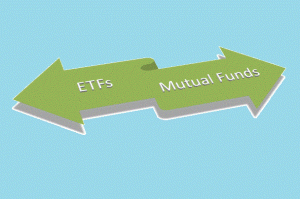Last year for the disinvestment programme PSU ETF was launched and not the common approach of public offering of shares. This was not without reason. Globally, exchange traded funds have proved to be one of the cost effective means of investing and the interest is slowly rising in India. Gold ETFs were quite a good hit with Indian investors and even the government felt that the ETFs will be a good means to bring more small investors in the equity market considering the ease of investing this avenue gives to the investors.
But mutual funds are the main medium of investing for small investors. In fact the slow acceptance of ETFs is due to the fact that investors have not find this style of investing convincing enough. However, Gold ETFs changed a lot and investors experienced the benefit of investing through this mode. Now the bigger question which will be asked is whether one should invest through mutual funds or ETFs? It’s difficult to answer unless you know the difference and the advantages of investing in ETFs. Also, unlike in US or other countries, the manufacturing of ETFs has to still gather pace in India.
So let’s understand what’s the difference between the two and what role ETFs can play in your investment portfolio –
Similarities
Mutual funds and ETFs have one factor in common – both are pool of funds. Put simply, like in a mutual fund many investors with same objective come together to create a pool of funds, in Exchange Traded Funds also pool of funds is created by investors with common objective to achieve. This pool of fund is then invested in basket of shares and units are created. So the PSU ETFs which was launched by the government for their disinvestment programme was again a pool of funds where investors whose objective was to gain from this initiative, invested in the offer.
Differences
There are many differences between mutual funds and ETFs which actually separates these two modes of investment-
- ETFs are Traded
As the name suggest Exchange Traded Funds are specifically traded at stock exchange much like a stock. Since they are listed and traded, their settlement process is also similar to a stock. Contrary to this when you invest in a mutual fund you are allotted the units on next day.
- Passively Managed
Most ETFs are passively managed i.e. they do not aim to outperform the benchmark indices. Here there is no fund manager involved and so the underline securities are not actively traded. Contrary to this most mutual funds schemes in India are actively managed where the fund manager take active calls in managing the underline investment portfolio. Having said that ETFs are not similar to Index Funds and have a different mechanism of working.
- Prices
Since mutual funds scheme NAV is declared at the end of the day so it does not vary for an investor and the investment happens at the closing day NAV. This is not the case with ETFs. They are traded on real time prices determined by the demand from the investors. So for investors the allotment price may vary at different times in a single day.
- Expenses
An ETF has much lower expenses as compared to mutual funds from similar category. This is primarily due to the fact that ETFs do not have any load like entry or exit and the operating expenses are also lower. However, investors have to still bear the expenses of demat account maintenance and brokerage for buying or selling at stock exchange. But this does not mean that ETFs themselves have nil expenses. The expenses within ETFs are shown by Tracking Error-which actually is the difference with which they lag the benchmark indices. Higher the tracking error lower the returns. But in general these are lower than a mutual funds scheme.
- Tax Efficient
In comparison to mutual funds ETFs are considered to be more tax efficient. Since ETFs are traded on the stock exchange you buy and sell ETFs and not the underlying securities. This has two impact – reductions of capital gains and lower expenses since there is no portfolio churning. Contrary to this actively managed mutual funds are actively traded so there will always be portfolio turnover and when you have to sell it the fund has to sell underline stocks to raise that much money. Any frequent churning in a mutual fund will result in higher expenses and also the capital gains.
Looking at the differences above ETFs do provide a cost effective means of investing. In last few years we have seen the rise of Gold ETFs and to some extent the sector based such as Banking, PSU etc.. In fact there are even fixed income ETFs which were first launched by Benchmark MF (Now Goldman Sachs MF). It’s surely the ease of buying and selling which makes it an attractive investment.
Having said that there are certain factors which have to be taken in consideration while investing. The first is the liquidity which will be higher in an equity ETF than a fixed income ETF. Secondly much like a stock it may lure you to trading opportunities which is good to avoid. In India we do not yet look at passive investing considering actively managed funds have beaten the benchmark consistently and ETFs too have their area of concerns, but it’s time that such passive products should find a place in your investment portfolio. Which ETFs to invest and how much is a decision to be taken only after analyzing your allocation well.
The article first appeared at moneycontrol.com
Share your views in comment section…..
Image courtesy: freedigitalphotos.net

Leave a Reply